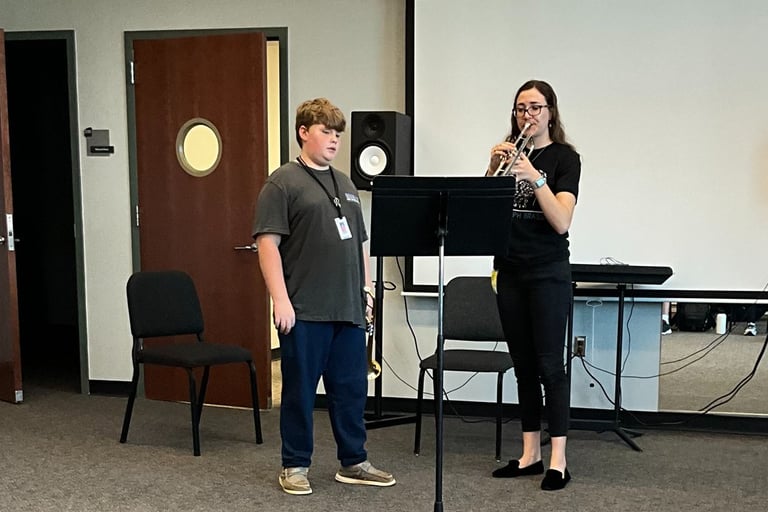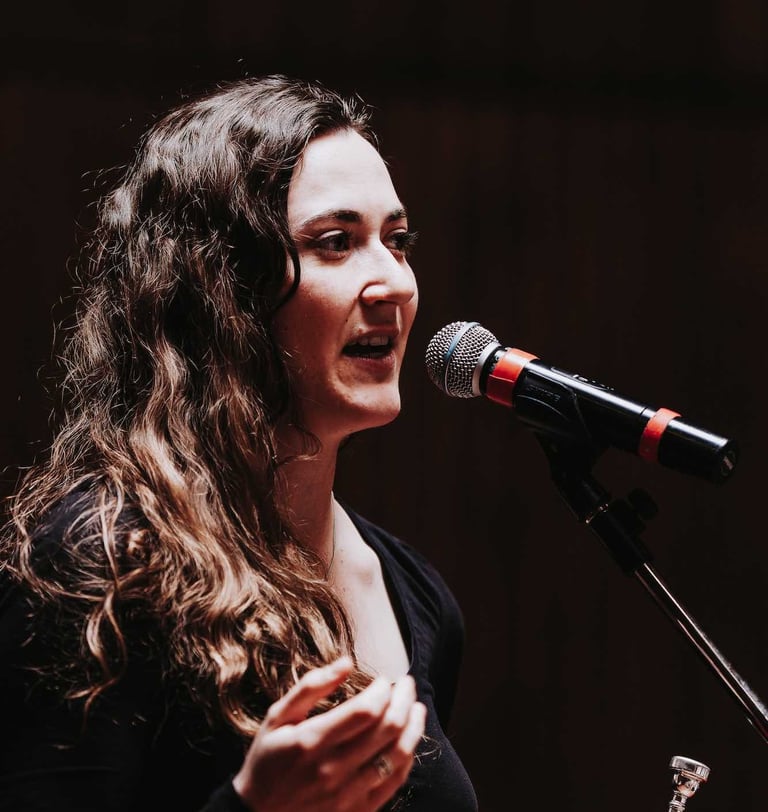TEACHING

Experience
Bethany is on faculty at the Music Institute of Chicago. She also teaches privately and has experience working one-on-one (and in groups) with students of all ages: elementary through high school, middle-aged, and retiree. It's never too late to improve upon your craft!
Philosophy
Bethany has studied with and been influenced by teachers from many different schools of pedagogical thought, but she counts the teachings of Bill Adam and Vincent Cichowicz (and the Chicago school more generally) as her strongest pedagogical influences. She believes that, in most cases, the conscious mind should have a limited role when it comes to the mechanics of trumpet playing. While having a healthy set-up and basic understanding of how the embouchure works is important (and she teaches those things), of even more importance is your concept of how you want to sound. As her former teacher, John Rommel, says - "you should have a very specific idea of how you want to sound and a very general idea of how to achieve it". That is to say, the specifics of the physiology of playing the trumpet are very complicated, and by consciously trying to make physical tweaks to our playing, we are likely to overdo things.
If we have a beautiful, resonant sound in our mind's eye when we go to play the trumpet, our subconscious mind will over time make minute changes to our body to bring us into alignment with our goal sound. We might be aware of these changes, but the goal is to not let them draw too much of our focus. To quote John Rommel again: "focus should be at least 90% on sound, 9% on air, and 1% on everything else." This focus on sound is why Bethany plays back and forth with students in lessons: imitation is the best teacher. Once the student has developed a beautiful sound, we focus on transferring that sound from note to note through all registers, supported by a body free of tension and by loose, constant air that meets the resistance of the trumpet without pushing past it. All of this is within the larger context of the music, which is why we do what we do! We should play everything as a musical statement, whether an exercise, etude, excerpt, or solo. Oftentimes when students are struggling with a passage, all it takes is a reminder to phrase in a certain way and their problem magically disappears! To that end, Bethany frequently has her students sing and buzz in lessons. When we take the valves/trumpet out of the equation and simplify down to the musical line, things tend to fall into place. While this is a broad pedagogical framework, Bethany customizes her teaching to each individual student and their needs.
Experience
Bethany is on faculty at Music Institute of Chicago. She also teaches privately and has experience working one-on-one (and in groups) with students of all ages: elementary through high school, middle-aged, and retiree. It's never too late to improve upon your craft!
Philosophy
Bethany has studied with and been influenced by teachers from many different schools of pedagogical thought, but she counts the teachings of Bill Adam and Vincent Cichowicz (and the Chicago school more generally) as her strongest pedagogical influences. She believes that, in most cases, the conscious mind should have a limited role when it comes to the mechanics of trumpet playing. While having a healthy set-up and basic understanding of how the embouchure works is important (and she teaches those things), of even more importance is your concept of how you want to sound. As her former teacher, John Rommel, says - "you should have a very specific idea of how you want to sound and a very general idea of how to achieve it". That is to say, the specifics of the physiology of playing the trumpet are very complicated, and by consciously trying to make physical tweaks to our playing, we are likely to overdo things.
If we have a beautiful, resonant sound in our mind's eye when we go to play the trumpet, our subconscious mind will over time make minute changes to our body to bring us into alignment with our goal sound. We might be aware of these changes, but the goal is to not let them draw too much of our focus. To quote John Rommel again: "focus should be at least 90% on sound, 9% on air, and 1% on everything else." This focus on sound is why Bethany plays back and forth with students in lessons: imitation is the best teacher. Once the student has developed a beautiful sound, we focus on transferring that sound from note to note through all registers, supported by a body free of tension and by loose, constant air that meets the resistance of the trumpet without pushing past it. All of this is within the larger context of the music, which is why we do what we do! We should play everything as a musical statement, whether an exercise, etude, excerpt, or solo. Oftentimes when students are struggling with a passage, all it takes is a reminder to phrase in a certain way and their problem magically disappears! To that end, Bethany frequently has her students sing and buzz in lessons. When we take the valves/trumpet out of the equation and simplify down to the musical line, things tend to fall into place. While this is a broad pedagogical framework, Bethany customizes her teaching to each individual student and their needs.


Rates
For lessons, Bethany charges 45 dollars for 40 min. and 60 dollars for an hour as a base rate. If she is traveling to you, she will suggest a higher fee based on distance. She teaches in person and over Zoom. Reach out to her through the "contact" section of this website if you're interested in arranging a lesson or masterclass.


Rates
For lessons, Bethany charges 45 dollars for 40 min. and 60 dollars for an hour as a base rate. If she is traveling to you, she will suggest a higher fee based on distance. She teaches in person and over Zoom. Reach out to her through the "contact" section of this website if you're interested in arranging a lesson or masterclass.


Photo by Curtis Perry Photography
